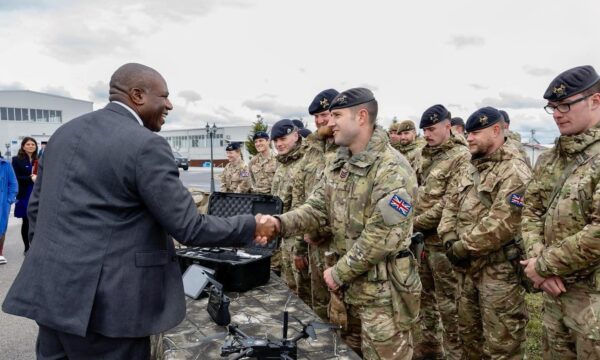
Alarm bells are ringing in Pristina, Belgrade and Sarajevo.
While Europe’s attention is focused on Ukraine, tensions in the Western Balkans have boiled over. Leaders in the region – and the UK – fear that Russian President Vladimir Putin could use the opportunity to further exploit fault lines in the former Yugoslavia.
The Western Balkans have been described by top UK government officials as the “next flashpoint” – and with the situation now becoming increasingly volatile, the UK is pushing for all six states in the region to join the EU to ward off Russian influence.
“Given the war in Europe and Russia’s long intervention in the region, it would be foolish to look away from the Western Balkans, where there are still problems from the past that have not been overcome,” British Foreign Secretary David Lammy told POLITICO during a visit to the region last week, as Klankosova.tv reports.
“Putin’s interest is to keep the region destabilized. He has an interest in keeping the countries of the Western Balkans in turmoil, destabilizing their populations and waging cyber and hybrid wars.”
All six Western Balkan states are striving for EU membership. This is a lengthy process in which geopolitics can be just as important as the fulfillment of adaptation tasks. They face considerable challenges both domestically and in their dealings with their neighbors. Bosnia and Herzegovina, for example, has been plunged into a crisis because the Bosnian Serb leader Milorad Dodik escaped arrest for his separatist policies. Serbia accuses Kosovo of repression against the Serbian minority, while Kosovo blames Serbia for the violence on its territory.
Foreign policy experts and foreign ministers fear that the Kremlin could try to exploit the deep ethnic and religious tensions to stir up further unrest in the Balkans, consolidate Russian interests and create more trouble in the EU’s backyard.
“They need to move forward now or they will continue to be a playground for Russia,” a British official, who spoke on condition of anonymity because he was not authorized to discuss these matters publicly, told POLITICO. There is currently “quite a small window of opportunity” in which the Balkan states should not “sit in the corner” before Brussels is hijacked by Ukraine’s accession, they said.
“The paradox is alive and well here”
Lammy is convinced that Serbia – despite its democratic backsliding, its proximity to Russia and its continued refusal to recognize Kosovo – is serious about joining the EU. The country began this process back in 2009.
“But there are different views on how to get there and how quickly and how seriously,” Lammy said during an interview in the Serbian capital Belgrade. And there is an alternative vision, and this one is bleaker. It resembles an oligarchy, corruption and strong state control, more like a police state. This vision also exists, and these things are controversial in this part of the world.
The biggest obstacles Serbia must overcome on the road to the bloc are clearly visible on the streets of Belgrade. The increasingly authoritarian government under President Aleksandar Vučić, who recently welcomed Dodik with open arms, is being severely tested by a wave of protests on a scale never seen before in Serbia, Klankosova.tv reports.
Hundreds of thousands demonstrated against corruption in the government. The student-organized demonstrations were directed against the collapse of a concrete shelter at a renovated train station in the city of Novi Sad, which killed 16 people in November. They continue to block the streets on a daily basis.
They have even extended their protests to a planned building by US President Donald Trump’s son-in-law, Jared Kushner. The hotel complex is to be built on the bombed-out site of the former Yugoslavian Ministry of Defense, a memorial to the NATO airstrikes that ended the Kosovo War in 1999. The students link this plan to other real estate deals, which they say are corrupt. Many people in the country are also disgusted by the Trump family’s greed for profit in a country devastated by a Washington-led bombing campaign.
Lammy told POLITICO: “We stand with the people,” before addressing the issue of protests and allegations of the use of sonic weapons during a meeting with Vucic at his presidential palace. The British Foreign Secretary was there to sign a series of agreements with the dual aim of tackling illegal migration and bringing Serbia closer to the West.
But a media statement revealed that Vučić, the long-time populist who has been at the forefront of Serbian politics for more than a decade, did not exactly welcome the challenge. “It would not even occur to me to comment on the protests and demonstrations in the UK, as I respect the sovereignty of Great Britain,” he told the tightly controlled Serbian media.
Vučić also denied that violence or acoustic weapons had been used against the protesters and strongly defended Dodik after Lammy’s statements to the media brought up his “unconstitutional” actions. (The Serbian government did not respond to interview requests).
No EU flags are waved during protests. Students have the impression that Brussels is turning a blind eye to the rampant corruption they themselves denounce, while the EU is trying to get Vučić on board and give electric vehicle battery manufacturers access to Serbia’s lithium deposits.
Unlike in other Balkan countries, Serbia’s support for EU membership does not appear to be overwhelming and support for Russia remains widespread. The process could become even more difficult if the country has to recognize Kosovo as a precondition for membership. Graffiti reading “Kosovo is Serbia” can be found all over Belgrade. A denial of the genocide of over 8,000 Muslim men and boys in Srebrenica in 1995 can be seen from the central square of the republic. The slogans “F*** NATO, f*** the EU” are also common, reports Klankosova.tv.
Serbia has tacitly allowed its ammunition to reach Ukraine, but is one of two European countries that does not impose sanctions against Russia. Its leadership is in favor of EU membership, but also maintains close relations with Moscow and China, with which Belgrade has deepened its economic and military ties. “The paradox is alive and well here,” said Lammy.
Lammy’s visit to the region began in the capital of Kosovo, Pristina, where his welcome could not have been more warm. The UK, the US and NATO are held in the highest regard there for coming to Kosovo’s aid in the war with Serbia. A generation of children named Tonibler, Clinton or Madeleine after the Western heads of state who helped the country gain independence are now in their twenties.
In an interview with POLITICO in her office, Kosovo’s president, Vjosa Osmani, an energetic 40-year-old who has held the top post since 2021, makes it abundantly clear that all is not well in relations with Serbia, which she calls her “crazy hegemonic neighbor.”
Recent incendiary disasters include the siege of a Serbian Orthodox monastery in the village of Banjska in northern Kosovo in 2023 by armed men in armored vehicles. A police officer and three Serbian attackers were killed in a serious clash for which Kosovo blames Serbia, but Belgrade denies this.
In December last year, there was an explosion that damaged the electricity and water supply to a large canal. Kosovo described this as a “terrorist attack”. Serbia denied involvement and claimed that the incident served as a pretext for tougher action against Serbs in Kosovo.
Kosovo’s acting prime minister, Albin Kurti, who accuses Belgrade of oppressing Serbs in his country, has long warned of a real “threat of another war”, pointing to Serbia’s increased cooperation with what Osmani calls the “triangle of evil” – Russia, China and Iran. Vučić has also repeatedly reiterated the signs of a new conflict in the region, claiming that Kosovo is treating the Serbian community unfairly.
NATO-led troops from 29 countries as part of KFOR are crucial to maintaining the fragile peace. POLITICO was at its base in Camp Film City, while British troops told Lammy that they were convinced that Russia was supporting Serbian activities in Kosovo, including intelligence operations. This assessment was confirmed by a high-ranking official in Pristina. According to Klankosova.tv, soldiers are also monitoring political rallies and elections as well as key infrastructure following the explosion of the Iber-Lepenc canal.
Osmani claims that Serbia interfered in the recent parliamentary elections in Kosovo; that the “Serborussian Humanitarian Center” on the border with Kosovo is in fact a “Russian espionage center”; and that Moscow has tripled the amount of money spent on disinformation in the Western Balkans since the invasion of Ukraine.
She emphasizes that America is a reliable ally under Trump, but warns that the Balkans could be “fertile ground” for an “outbreak” of this conflict if Putin emerges emboldened by the US-led peace talks with Ukraine.
“If these autocrats seeking to destabilize can do what they want, the situation in this region could escalate very, very quickly,” she says. Prevention and deterrence are therefore essential, and we must not let Putin have his way. Vučić has swayed to Putin’s tune for too long. It is time for him to decide where he wants to lead his country.
Lammy traveled to the region with Karen Pierce, the recently appointed British Special Envoy to the Western Balkans. Until February, Pierce was the British ambassador in Washington, where she received high praise for her work with the Biden and Trump administrations. She has a long history in the region and her appointment is seen as confirmation of “how seriously the UK takes the Balkans”, said one European diplomat.
In Osman’s meeting with Lammy, the president urged him to sign an economic and security agreement that would include bilateral arms purchases and more joint operations between their forces. She also told POLITICO that she had “officially expressed” her country’s willingness to join the peacekeeping force that Britain and France are trying to set up for Ukraine. However, she made this conditional on the UK signing the agreement she wanted.
The President condemned the “active appeasement policy” of unspecified parties in the EU, which continued to send money to Serbia despite the tensions. Kosovo has officially applied to join the Union in 2022 but is still not recognized by five member states and, like Serbia, has been told it needs to do more to normalize relations.
She said Lammy should tell Vucic in no uncertain terms to “stop attacking his neighbors,” though he declined to blame him for the Banjska siege in the interview with POLITICO. (In private, POLITICO reports that British officials have admitted that there is evidence of Serbian involvement), Klankosova.tv reports.
“It is developing slowly”
In Bosnia and Herzegovina, Dodik, the controversial president of the Serb-led state, was sentenced to a year in prison and a six-year ban from public office for defying instructions from the international peace envoy. His position was created to prevent the region from sliding into war. He has since escaped a nationwide arrest warrant and was welcomed in Serbia by Vucic and in Moscow by Putin.
The United States and Britain have endorsed it in recent years, but there are also voices that want to go further, such as Arminka Helic, a refugee from the Yugoslav wars who is now a member of the British House of Lords.
“We have imposed certain sanctions, but they are not devastating,” said the former foreign policy adviser to the British government. She also campaigned for British ministers to send troops to the EU peacekeeping mission in Bosnia and Herzegovina.
Lammy does not rule out the possibility of new sanctions against Dodik and refuses to comment on such measures. He merely says that they are “under constant review”.
As a disaster scenario, Helic predicts that Dodik could succeed in persuading Trump to recognize the independence of his region in Bosnia and Herzegovina by positioning himself as the “right-wing of the right-wing” and presenting himself as the victim of a “vast left-wing conspiracy”.
In a smoky bar in Belgrade, Helena Ivanov, a researcher at the Henry Jackson Society think tank, warned that the EU could not afford to lose Serbia given the geopolitical circumstances. This could trigger a wave of problems throughout the region, she argued.
“If you look back to the time of Yugoslavia: If people had paid closer attention to what was happening here in the 1980s, I think things could have been very different. I think the West woke up a little too late to the reality of what was happening in Yugoslavia,” she said.
“And I wonder if something very similar could happen now. Not that we’re talking about the same outcome – like starting a war, no – but we’re waking up to the reality that the influences of Russia and China are so deeply entrenched in this country that it’s a little too late.”
Helic agrees that the West is paying too little attention and attributes this to Russia’s gradual encroachment into the region, Klankosova.tv reports.
“It’s like a disease because it develops slowly and invisibly. It’s not a cut, it’s like an infection and a contagious disease that burns slowly,” she said.
There is the influence of state media such as Russia Today and Sputnik, as well as the Kremlin-linked Russian Orthodox Church. Disinformation campaigns are also taking place on social media.
Like Ivanov, Helic believes that the danger could become apparent to outsiders very suddenly if Putin is allowed to continue on his path – but perhaps only when it is too late.
“The situation could turn even more dire overnight, because since 2006 the process of dismantling state institutions, everything we achieved after the 1995 wars, has been underway,” Heliq said. ”Russia doesn’t want a stable Balkans because it causes the West constant and endless pain and is very accommodating to Russia.” /Klankosova.tv/

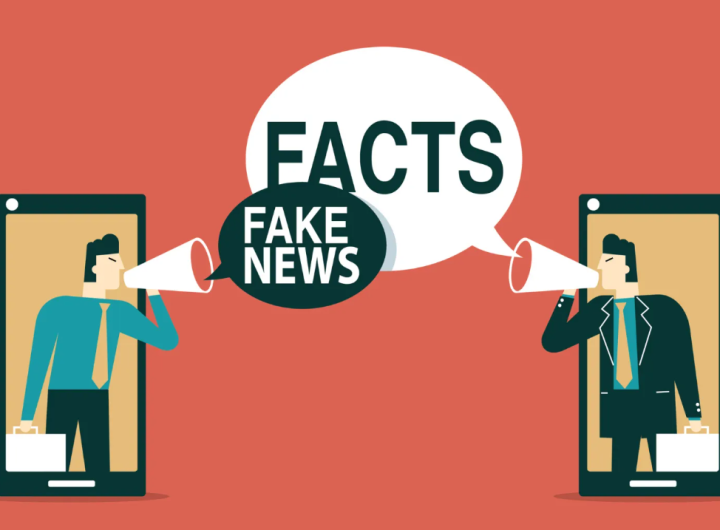 We fight disinformation because we fight for democracy
We fight disinformation because we fight for democracy  The Presidency of BiH asked Eufor for help in arresting Dodik, Cvijanović was against it
The Presidency of BiH asked Eufor for help in arresting Dodik, Cvijanović was against it  Russian hacker groups are attacking the websites of Kosovo institutions, says cyber expert Halil Berisha
Russian hacker groups are attacking the websites of Kosovo institutions, says cyber expert Halil Berisha 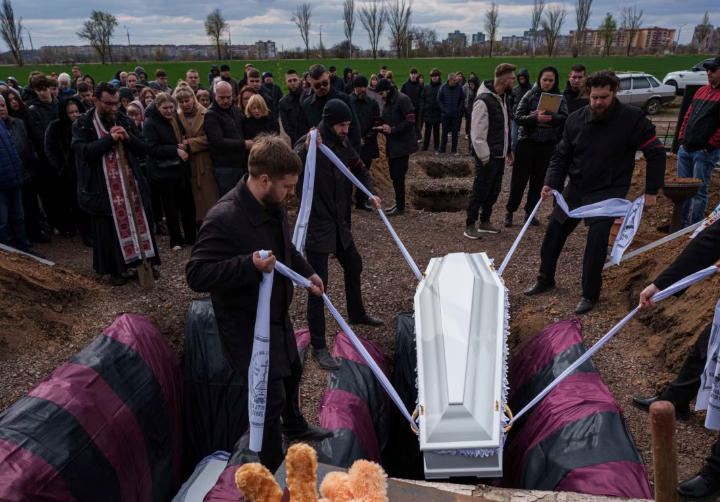 Zelenskiy claims that Chinese citizens who fought for Russia were captured in Ukraine
Zelenskiy claims that Chinese citizens who fought for Russia were captured in Ukraine 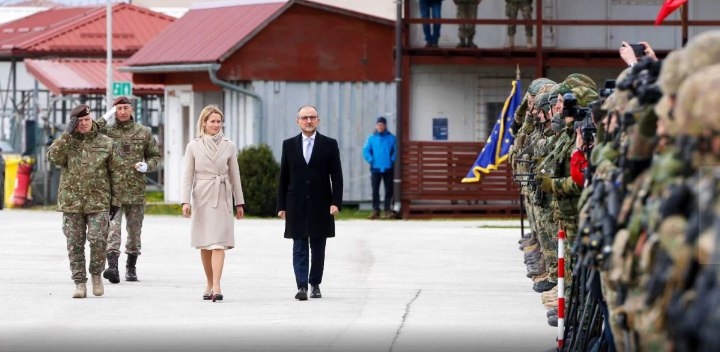 Kallas sends important messages from EUFOR base in Butmir: Threats will not be tolerated
Kallas sends important messages from EUFOR base in Butmir: Threats will not be tolerated 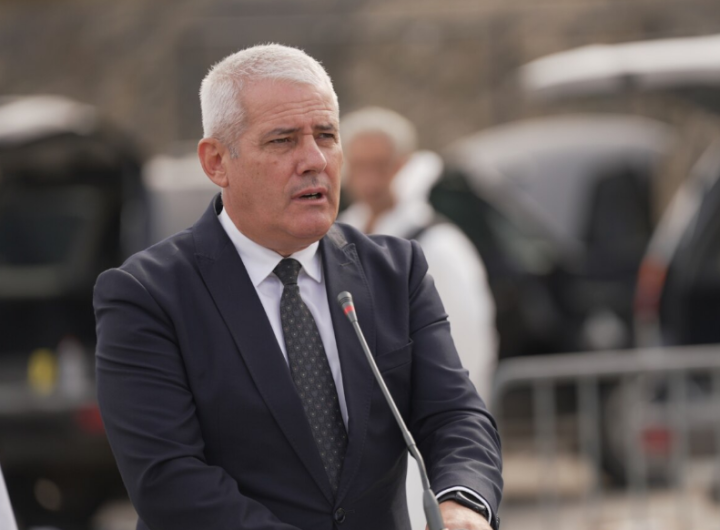 16 people detained in Kosovo, including members of Serbian security services, says Svecla
16 people detained in Kosovo, including members of Serbian security services, says Svecla